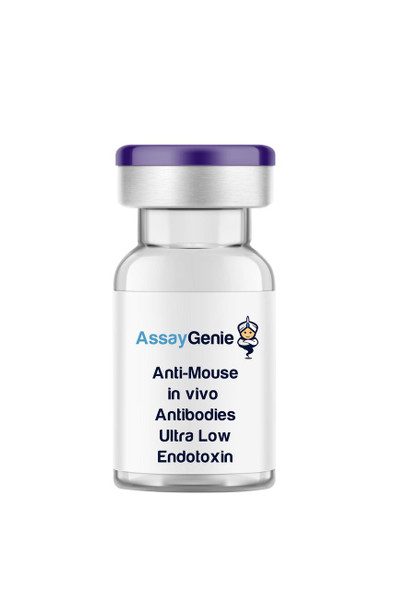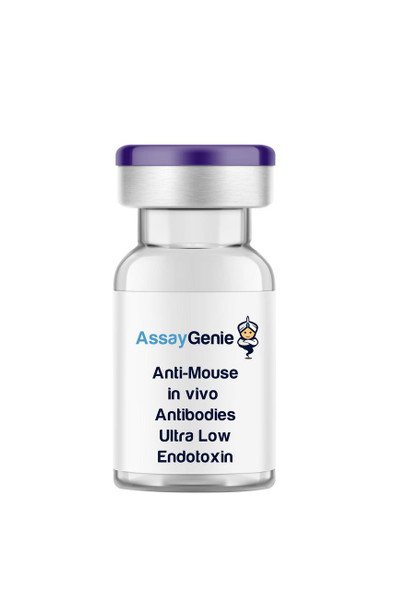Anti-Mouse I-A/I-E (MHC Class II) In Vivo Antibody - Low Endotoxin
- SKU:
- IVMB0357
- Product Type:
- In Vivo Monoclonal Antibody
- Clone:
- M5/114.15.2
- Protein:
- I-A/I-E ⋅ MHC class II
- Isotype:
- IgG2b
- Reactivity:
- Mouse
- Research Area:
- Immunology
- Research Area:
- Innate Immunity
- Endotoxin Level:
- Low Endotoxin
- Host Species:
- Rat
- Applications:
- Blocking
- Applications:
- FC
- Applications:
- IHC FF
- Applications:
- In Vivo
- Applications:
- IP
- Applications:
- PhenoCycler
Description
| Product Name: | Anti-Mouse I-A/I-E (MHC Class II) In Vivo Antibody - Low Endotoxin |
| Product Code: | IVMB0357 |
| Size: | 1 mg, 5 mg, 25 mg, 50 mg, 100 mg |
| Clone: | M5/114.15.2 |
| Protein: | I-A/I-E ⋅ MHC class II |
| Product Type: | Monoclonal Antibody |
| Isotype: | IgG2b |
| Reactivity: | Mouse |
| Applications: | B, FC, IHC FF, In Vivo, IP, PhenoCycler® |
| Formulation: | This monoclonal antibody is aseptically packaged and formulated in 0.01 M phosphate buffered saline (150 mM NaCl) PBS pH 7.2 - 7.4 with no carrier protein, potassium, calcium or preservatives added. Due to inherent biochemical properties of antibodies, certain products may be prone to precipitation over time. Precipitation may be removed by aseptic centrifugation and/or filtration. |
| Endotoxin Level: | < 1.0 EU/mg as determined by the LAL method |
| Purity: | ≥95% monomer by analytical SEC ⋅ >95% by SDS Page |
| Product Preparation: | Functional grade preclinical antibodies are manufactured in an animal free facility using in vitro cell culture techniques and are purified by a multi-step process including the use of protein A or G to assure extremely low levels of endotoxins, leachable protein A or aggregates. |
| Applications: | B, FC, IHC FF, In Vivo, IP, PhenoCycler® |
| Reactivity: | Mouse |
| Host Species: | Rat |
| Specificity: | Clone M5/114.15.2 recognizes an epitope on the mouse MHC class II molecules I-Ab, I-Ad, I-Aq, I-Ed, and I-Ek. Clone M5/114.15.2 does not react with I-Af, I-Ak, or I-As. |
| Antigen Distribution: | I-Ab/d/q and I-Ed/k are expressed on antigen-presenting cells, including macrophages, monocytes, DCs, and B cells, and activated T cells from mice of the I-Ab/d/q and I-Ed/k haplotypes. |
| Immunogen: | C57BL/6 Spleen Cells |
| Concentration: | ≥ 5.0 mg/ml |
| Endotoxin Level: | < 1.0 EU/mg as determined by the LAL method |
| Formulation: | This monoclonal antibody is aseptically packaged and formulated in 0.01 M phosphate buffered saline (150 mM NaCl) PBS pH 7.2 - 7.4 with no carrier protein, potassium, calcium or preservatives added. Due to inherent biochemical properties of antibodies, certain products may be prone to precipitation over time. Precipitation may be removed by aseptic centrifugation and/or filtration. |
| Purity: | ≥95% monomer by analytical SEC ⋅ >95% by SDS Page |
| Preparation: | Functional grade preclinical antibodies are manufactured in an animal free facility using in vitro cell culture techniques and are purified by a multi-step process including the use of protein A or G to assure extremely low levels of endotoxins, leachable protein A or aggregates. |
| Storage and Handling: | Functional grade preclinical antibodies may be stored sterile as received at 2-8°C for up to one month. For longer term storage, aseptically aliquot in working volumes without diluting and store at -80°C. Avoid Repeated Freeze Thaw Cycles. |
| Protein: | I-A/I-E ⋅ MHC class II |
| Ligand/Receptor: | CD3/TCR, CD4 |
| Research Area: | Immunology, Innate Immunity |
| Shipping: | 2-8°C |
| PubMed: | I-A/I-E |
| NCBI Gene Bank ID: | 14961 |
| UniProt: | Information on Uniprot.org |





![Anti-Mouse H-2Kb (MHC Class I) [Y-3] In Vivo Antibody - Low Endotoxin Anti-Mouse H-2Kb (MHC Class I) [Y-3] In Vivo Antibody - Low Endotoxin](https://cdn11.bigcommerce.com/s-rd6ounxcu2/images/stencil/590x590/products/78655/83837/anti-mouse-h-2kb-mhc-class-i-y-3-in-vivo-antibody-low-endotoxin__11576__63093.1706545297.jpg?c=1)
![Anti-Mouse MHC Class I (H-2Kb) [AF6-88.5] In Vivo Antibody - Low Endotoxin Anti-Mouse MHC Class I (H-2Kb) [AF6-88.5] In Vivo Antibody - Low Endotoxin](https://cdn11.bigcommerce.com/s-rd6ounxcu2/images/stencil/590x590/products/78998/84180/anti-mouse-mhc-class-i-h-2kb-af6-88.5-in-vivo-antibody-low-endotoxin__33965__35116.1706545532.jpg?c=1)